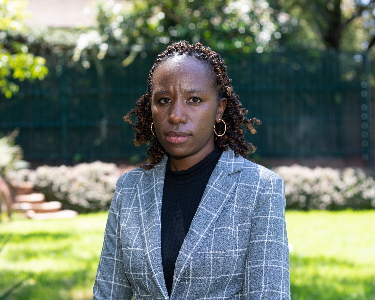Uncovering links between depression and hypertension in African populations
- Wits University
Dr Vivien Chebii receives Wellcome Early Career Award to study whether mental illness and cardiometabolic disorders share genetic pathways.
In Africa, 150 million people live with hypertension, 54 million with diabetes, and over 40 million battle depression or bipolar disorder.
“In Africa, the twin burden of mental illness and cardiometabolic disease is a silent crisis,” says Dr Vivien Chebii, a researcher at the Sydney Brenner Institute for Molecular Bioscience (SBIMB) who was awarded the prestigious Wellcome fellowship.

This dual burden of the diseases is particularly challenging, says Chebii, as one condition may exacerbate the other. Those who live with poor mental health face an increased risk of developing cardiometabolic diseases and vice versa.
The Wellcome fellowship therefore enables Chebii to uncover whether one possible gene in African populations can affect multiple disorders, like depression and cardiometabolic diseases. Emerging studies show they share biological mechanisms such as disrupted stress pathways, circadian rhythm chaos and chronic inflammation.
“This fellowship will fill an important gap in our research. It provides a crucial foundation for future studies exploring genetic traits across multiple conditions, ultimately paving the way for better clinical care,” says Chebii.
This study will focus on African populations, where genomic research remains sparse despite the continent’s rich diversity. Harnessing Africa’s genetic diversity can provide critical insights into the foundations of complex diseases, benefiting humanity at large.
Globally, 350 million people live with depression or bipolar disorder, while a staggering 2.5 billion are affected by conditions like diabetes and hypertension.
With additional research, more inclusive, precise and effective therapeutic strategies can be implemented. In particular, targeting “pleiotropic” mechanisms for the treatment of multiple conditions is possible. Pleiotropy is where a single gene influences multiple, seemingly unrelated, phenotypic traits.
Chebii notes that rapid urbanisation is driving a surge in both, but that mental health remains underdiagnosed, underfunded and affected by stigma.
“In Kenya, where I come from, one in two people with diabetes also suffer from depression. Yet we continue to study and treat these conditions in silos.”
Beyond co-occurrence, these conditions amplify each other’s impact and overwhelm families and strain already-fragile health systems. Chebii’s research underscores the possibility and importance of integrated healthcare approaches to manage interconnected conditions.
Professor Michèle Ramsay, Director of the SBIMB, explains that while the diseases share key risk factors, such as lifestyle and environment, “there is a genetic foundation we don’t fully understand. Africa carries the richest genetic diversity in the world and faces an alarming rise in dual-disease burdens. Dr Chebii’s study is timely and urgent.”
Chebii’s winning study, Shared Genetics of Cardiometabolic and Mood Disorders: African Genomic Insights, will run for five years. The fellowship also allows for local research capacity development.

